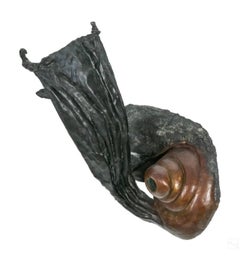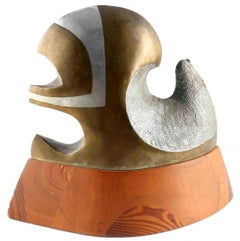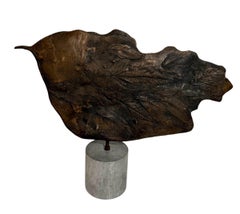Want more images or videos?
Request additional images or videos from the seller
1 of 12
Phoebe AdamsLarge Biomorphic Abstract Bronze Sculpture Phoebe Adams Wall Hanging1985
1985
$10,000List Price
About the Item
- Creator:Phoebe Adams (1953, American)
- Creation Year:1985
- Dimensions:Height: 38 in (96.52 cm)Width: 45 in (114.3 cm)Depth: 16 in (40.64 cm)
- Medium:
- Movement & Style:
- Period:
- Condition:minor wear commensurate with age.
- Gallery Location:Surfside, FL
- Reference Number:1stDibs: LU3828409182
About the Seller
4.9
Platinum Seller
Premium sellers with a 4.7+ rating and 24-hour response times
Established in 1995
1stDibs seller since 2014
1,846 sales on 1stDibs
Typical response time: 1 hour
Authenticity Guarantee
In the unlikely event there’s an issue with an item’s authenticity, contact us within 1 year for a full refund. DetailsMoney-Back Guarantee
If your item is not as described, is damaged in transit, or does not arrive, contact us within 7 days for a full refund. Details24-Hour Cancellation
You have a 24-hour grace period in which to reconsider your purchase, with no questions asked.Vetted Professional Sellers
Our world-class sellers must adhere to strict standards for service and quality, maintaining the integrity of our listings.Price-Match Guarantee
If you find that a seller listed the same item for a lower price elsewhere, we’ll match it.Trusted Global Delivery
Our best-in-class carrier network provides specialized shipping options worldwide, including custom delivery.You May Also Like
Bronze Sculpture “Over Time”
By Frank Arnold
Located in Fresno, CA
Frank Arnold is thought by many to be one of the foremost abstract figurative painters and sculptors of our time. He is a living master whose work is considered to be both personal a...
Category
2010s Abstract Abstract Sculptures
Materials
Bronze
Guard 8
By Frank Arnold
Located in Fresno, CA
Frank Arnold is thought by many to be one of the foremost abstract figurative painters and sculptors of our time. He is a living master whose work is considered to be both personal a...
Category
21st Century and Contemporary Abstract Abstract Sculptures
Materials
Bronze
Bronze Sculpture “Arroyo Reina”
By Frank Arnold
Located in Fresno, CA
Frank Arnold is thought by many to be one of the foremost abstract figurative painters and sculptors of our time. He is a living master whose work is considered to be both personal a...
Category
2010s Abstract Abstract Sculptures
Materials
Bronze
Woman 4
By Frank Arnold
Located in Fresno, CA
Frank Arnold is thought by many to be one of the foremost abstract figurative painters and sculptors of our time. He is a living master whose work is considered to be both personal a...
Category
2010s Abstract Abstract Sculptures
Materials
Bronze
Bronze Sculpture “Spirit”
By Frank Arnold
Located in Fresno, CA
Frank Arnold is thought by many to be one of the foremost abstract figurative painters and sculptors of our time. He is a living master whose work is considered to be both personal a...
Category
2010s Abstract Abstract Sculptures
Materials
Bronze
Woman 2
By Frank Arnold
Located in Fresno, CA
Frank Arnold is thought by many to be one of the foremost abstract figurative painters and sculptors of our time. He is a living master whose work is considered to be both personal a...
Category
21st Century and Contemporary Abstract Abstract Sculptures
Materials
Bronze
Sage Mano
By Frank Arnold
Located in Fresno, CA
Frank Arnold is thought by many to be one of the foremost abstract figurative painters and sculptors of our time. He is a living master whose work is considered to be both personal a...
Category
21st Century and Contemporary Abstract Abstract Sculptures
Materials
Bronze
Bronze Sculpture “Understander”
By Frank Arnold
Located in Fresno, CA
Frank Arnold is thought by many to be one of the foremost abstract figurative painters and sculptors of our time. He is a living master whose work is considered to be both personal a...
Category
2010s Abstract Abstract Sculptures
Materials
Bronze
Neuvoa
By Frank Arnold
Located in Fresno, CA
Frank Arnold is thought by many to be one of the foremost abstract figurative painters and sculptors of our time. He is a living master whose work is considered to be both personal a...
Category
21st Century and Contemporary Abstract Abstract Sculptures
Materials
Bronze
Amazing Original Fahri Aldin Bronze Sculpture. Limited Edition Stunning New Work
By Fahri Aldin
Located in Belleville, CA
An Amazing New Piece at an Incredible Price by renowned Canadian Artist Fahri Aldin. This Stunning Beauty titled 'The Stallion' is Limited Edition 2 out of 27. From his latest series...
Category
2010s Abstract Expressionist Abstract Sculptures
Materials
Bronze
$1,199
H 14.5 in W 9 in D 4 in
More From This Seller
View AllArgentine Modernist Brutalist Abstract Bronze Sculpture Jewish Latin American
By Naum Knop
Located in Surfside, FL
Naum Knop (Ukrainian-Argentinean, 1917-1993) Modernist Brutalist bronze figural sculpture with heavy verdigris green finish. Melted forms in the shape of an abstract pretzel like twist. Affixed to white stone plinth. Artist signature, "NK" side of base. Good condition, shows rich green patina and aged oxidation. Measures approximately 17.5 in. x 19.5 in. x 6.5 in.
Naum Knop, Argentine sculptor, was born in 1917 in Buenos Aires, into a Jewish family of Russian origin from Ukraine. His childhood was spent in the neighborhood of La Paternal where his father had a carpentry workshop, a space in which he made contact for the first time with the technique of wood carving. After finishing elementary school, he worked with the teacher Luis Fernández and soon after he dedicated himself to furniture design. Around 1935, he entered the Manuel Belgrano School of Fine Arts . Between 1941 and 1942 he attended the course for graduates taught by Alberto Lagos and Alfredo Bigatti at the National School of Fine Arts and continued his training between 1942-1945 at the Ernesto de la Cárcova High School with Soto Avedaño, Carlos de la Cárcova and José Fioravanti. At this time he put his works in dialogue with other young artists such as Libero Badii and Aurelio Macchi .
Around 1947 he made his study trip abroad. He goes to California, United States, where he enters the Art Institute of Los Angeles. At the same time visit museums and galleries. In January 1948 he organized his first exhibition abroad, held at the Hall of Arts in Beverly Hills in Los Angeles. During this period he toured Chicago and then New York. That year he traveled to Europe; his itinerary includes France, Italy, Switzerland and England. As a result, he came into contact with the work of Henry Moore, Hans Jean Arp, Jacques Lipchitz, Constantin Brancusi, Umberto Boccioni, Henry Laurens, Ossip Zadkine. Artists who have an impact on the young Knop and whom he honors in his subsequent production. He returned to Argentina in 1949 and installed his workshop where he worked on ornamental carving and on pieces in which he oscillated between a synthetic figuration and abstraction.
In 1956 he began his successful participation in salons , obtaining numerous awards at the national and municipal level. In 1959 he participated in the shipment to the 5th São Paulo Biennial and since then, to the success achieved at the local level, the multiple exhibitions carried out in the international field have been added. The exhibitions in Tel Aviv , Jerusalem and Rome (1966) stand out; Dusseldorf (1977); Los Angeles and Palm Spring (1981); New York (1986), San Pablo and Los Angeles(1989). During this period, his work matured, while he began to experiment with the direct wax technique, obtaining textured surfaces similar to welds that gave it a strong abstract expressionist feature. In parallel to his personal production and to the small models, the artist receives private and public commissions for which he works on large-scale sculptures and murals. Around 1967, the architect Mario R. Álvarez summons him to participate in a closed competition for the creation of a work to be located in the General San Martín Cultural Center . Libero Badii and Enio Iommi participate with the artist ; the bronze Reclining Figure Knop is chosen. Among the large-scale monuments it is worth remembering the piece Los tres soles temporarily located in Recoleta in 1984 and later installed in Maryland, United States; as well as Seated Figure (Reminiscence of Michelangelo) located in the shield of a private building in 1970. To these are added the numerous murals in which he experiments with various materials and techniques such as casting in bronze, openwork and reliefs in wood and work in cement.
He was included in the The 1962 International Prize for Sculpture the jury included Argan, Romero Brest and James Johnson Sweeney the former director of the Solomon R. Guggenheim Museum in New York. The participants included Louise Nevelson and John Chamberlain for the United States; Lygia Clark for Brazil; Pietro Consagra, Lucio Fontana, Nino Franchina, and Gió Pomodoro for Italy; Pablo Serrano for Spain; and Eduardo Paolozzi, William Turnbull, and Kenneth Armitage for England. Gyula Kosice, Noemí Gerstein, Julio Gero, Naum Knop, Aldo Paparella, Enrique Romano, Eduardo Sabelli, and Luis Alberto...
Category
Mid-20th Century Abstract Abstract Sculptures
Materials
Stone, Bronze
Large Biomorphic Abstract Bronze Sculpture Phoebe Adams Wall Hanging
Located in Surfside, FL
"What Remains"
Cast bronze with patina, 1985.
Cast at Johnson Atelier, Hamilton NJ
Exhibited at Guggenheim Museum 1985
Provenance: Sold through Grace Borgenicht Gallery, NY
The second photo is the picture in the catalogue. I received it from the artist. I do not have the catalogue available.
Studio handcrafted solid cast bronze Biomorphic shell wall sculpture. Abstract exoskeleton theme. This is a corner piece as can be seen in the catalogue photo (we do not have the catalogue). To be mounted on left side wall of corner, piece reached across to right side across corner (as per artists instructions).
Phoebe Adams...
Category
1980s Abstract Abstract Sculptures
Materials
Bronze
Chester Williams, Black Artist, Abstract Bronze, Wood African American Sculpture
Located in Surfside, FL
Chester L. Williams
Label on bottom, signed. Title: Promethium
Medium: Bronze, Aluminum and wood.
Approx. dimensions: 12 X 11 X 4 inches.
Chester Lee Williams (1944-1919) was born in 1944, in Durham, North Carolina. Chester cultivated a creative mind that eventually led him to pursue an education in fine arts and sculpture at North Carolina Central University (BA) and the University of Michigan (MFA). In 1974, he made his way to Tallahassee and started instructing at FAMU. Students at the university have a deep appreciation for the jazz lover’s insight and skill. A lifelong artist, Chester's work has been featured in galleries and publications across the country. The body of his work produced over 45 years has evolved from smooth and supple sculptures into the more angular and defiant shapes seen in his later works. Chester has said: "All of the works are me. I still embrace every one of them." Chester enjoyed traveling and exploring different cultures. His art was influenced by his travel and knowledge of African culture. He was an educator for 37 years, teaching at Voorhees College, North Carolina Central University and Florida A&M University before retiring in 2011.
He sold his first piece of art in the ninth grade to his homeroom teacher. (That early sale paid off — years later, that teacher’s husband, the president of a bank, commissioned Williams to create a sculpture for the bank’s lobby...
Category
20th Century Abstract Abstract Sculptures
Materials
Metal, Bronze
Large Latin American Modernist Bronze Abstract Cuban Master Roberto Estopinan
By Roberto Estopiñan
Located in Surfside, FL
Roberto Estopinan, Cuban, 1920 - 2015
Dimensions: 24.5" wide x 13" high plus 6" high base.
Roberto Estopiñán (1921–2015) was a Cuban American sculptor known for his sculptures of the human form, including political prisoners. Born in Camaguey, Cuba, he lived in the United States for over fifty years. His works are held by major institutions such as the Museum of Modern Art, the Whitney Museum and the Smithsonian Museum of American Art.
Roberto Gabriel Estopinan, a sculptor, draftsman, and printmaker, was born in Havana, Cuba on March 18, 1921. Estopiñán enrolled at the San Alejandro Academy when he was just 14 years old and became the protegé and studio assistant of the sculptor Juan José Sicre. After graduation he traveled first to Mexico, where he met and befriended Francisco Zuniga, and studied Pre-Columbian sculpture. In 1949 he traveled to Europe, visiting England, France and Italy. In these trips he encountered the sculpture of Henry Moore and Marino Marini, and their humanistic yet formal visions would be influential on Estopinan's work. Estopiñán was a pioneer of direct carvings using wood and of welding techniques in Latin America. Throughout the 1950s, Estopiñán received important prizes at various national exhibitions in Havana. In 1953 he was the only semi-finalist from Latin America at the Tate Gallery's international sculpture competition for a Monument to the Unknown Political Prisoner. In 1961, the artist moved to New York, where he resided until 2002.
Roberto Gabriel Estopiñán a Cuban emigre sculptor who emigrated to exile in the United States not long after Fidel Castro’s revolution in 1959, is considered one of Latin America’s most important 20th-century artists. His work, which includes drawings and prints as well as sculptures in wood and bronze, is in the collections of New York’s Museum of Modern Art, the Smithsonian’s American Art Museum, the Art Institute of Chicago, and the Detroit Institute of Art, among many locations. He is best known for his stark, disturbing renderings of political prisoners, the fruit of his own experiences as a dissident under both Castro and his predecessor, the dictator Fulgencio Batista, and for his representations of the female torso that can remind viewers of both classical statuary and the high-modern, abstractly elongated work of Henry Moore.mHe was born in Havana to a father from Asturias in northwest Spain and a mother of African descent. Estopiñán was something of a prodigy. At the age of fourteen, he won the first prize in drawing at the Centro Asturiano, a regional association for Cubans of Asturian descent. Shortly afterward he received special permission to enter the San Alejandro Academy of Fine Arts in Havana. At the school he was mentored first by its director, the painter Armando Menocal (1863-1941), then by the landscape artist Antonio Rodríguez Morey (1872-1967), and finally by Juan José Sicre (1898-1974), regarded as one of Cuba’s greatest sculptors. Sicre, a professor of sculpture at the Academy, had helped introduce European modernist art to Cuba, and from the 1930s through the 1950s had sculpted monumental figures in Havana of José Martí and other Cuban national heroes that stand to this day. Estopiñán was first Sicre’s student, then his assistant, and, finally, his colleague for the next fifty years. After graduating from San Alejandro in 1942, Estopiñán began simultaneously teaching art at the Ceiba del Agua School for young men, assisting Sicre in public art projects and developing his own artistic vision. He also traveled widely, to Mexico, New York, France, and Italy. From the late 1940s through the 1950s his sculpture evolved from an early neoclassical phase under the influence of Maillol to what he defined as “formalist humanism”: emphasizing the abstract beauty of the shapes he sculpted while not abandoning the human figure as the basis of his work. As the 1950s progressed he chose to carve in native Cuban woods...
Category
20th Century Abstract Figurative Sculptures
Materials
Bronze
Bronze Sculpture Abstract Brutalist Goat or Ram WPA Artist Mounted on Base
By Benedict Michael Tatti
Located in Surfside, FL
Benedict Tatti (1917-1993) worked in New York city as a sculptor, painter, educator, and video artist. He studied stone and wood carving under Louis Slobodkin at the Roerich Museum. He later attended the Leonardo da Vinci School of Art studying under Attilio Piccirelli. In l939 he taught adult classes with the Teachers Project of the WPA and attended the Art Students League for three and a half years on full scholarship. He studied under William Zorach and Ossip Zadkine and later became Zorach’s assistant. Later in his career, he attended the Hans Hofmann School of Fine Arts. During World War II, Tatti served in the United States Army Air Force, where he spent three years assigned to variety of projects. In 1948, Benedict Tatti married Adele Rosenberg in New York City.
Throughout his career, Tatti continuously experimented with various media. From 1952-1963, Tatti executed sculptural models of architectural and consumer products for the industrial designers, Raymond Loewy Associates; later he became a color consultant for the firm. In the 1960s, influenced by the Abstract Expressionists, Tatti turned from carving directly in wood and stone to creating assemblage architecture sculptures, using bronze metal and other industrial materials.
He was included in the important show "Aspects de la Sculpture Americaine", at Galerie Claude Bernard Paris, France, in October 1960 along with Ibram Lassaw, Theodore Roszak, David Smith, Louise Bourgeois, Danese Corey, Dorothy Dehner, Lin Emery, Lily Ente, David Hayes, Louise Nevelson, Tony Rosenthal, Richard Stankiewicz, Sam Szafran...
Category
Mid-20th Century Abstract Expressionist Abstract Sculptures
Materials
Bronze
Early Murano Glass Free Form Abstract Blown, Cut, Glass Sculpture in Bronze Vase
Located in Surfside, FL
This piece appears unsigned and unmarked. It came from an important estate in the Palm Beach area.
It is an abstract flame or torch in a bronze vase.
Venetian glass (Italian: vetro ...
Category
1940s Abstract Abstract Sculptures
Materials
Bronze
Still Thinking About These?
All Recently ViewedMore Ways To Browse
Abstract Shell Sculpture
Human Bone
M Fisher
Vintage Pfaff
Andy Warhol Joseph Beuys
Jan Grotenbreg
Janice Rogers
Japanese Exhibition Poster
Japanese Street Art
Jewish Prayer Art
John Finch
Joyce Moore
Judith Light
Katerina Skasi
Kaws Companionship In The Age Of Loneliness
Kaws The Promise
Keith Haring Paris
Leningrad Poster



